O'Brien and Krauss: A Comparative Study of Grief, Trauma, and Loss
VerifiedAdded on 2023/05/29
|5
|1476
|375
Essay
AI Summary
This essay provides a comparative analysis of grief and trauma as portrayed in Tim O'Brien's 'The Things They Carried' and Nicole Krauss's 'The History of Love.' It explores how different characters in each book experience and react to loss, examining the impact of trauma on their lives. The essay discusses how O'Brien's characters, such as the narrator, Jimmy Cross, and Norman Bowker, grapple with guilt and trauma resulting from the Vietnam War, while Krauss's characters, Leo Gursky and Alma Singer, deal with loss and its intergenerational effects in 'The History of Love'. The analysis considers how gender influences the experience of grief and highlights the theme of intergenerational trauma in Krauss's work, contrasting it with the war-related trauma in O'Brien's novel. The essay concludes by noting similarities in gender representation and the role of women in causing grief and trauma in the lives of men in both novels.
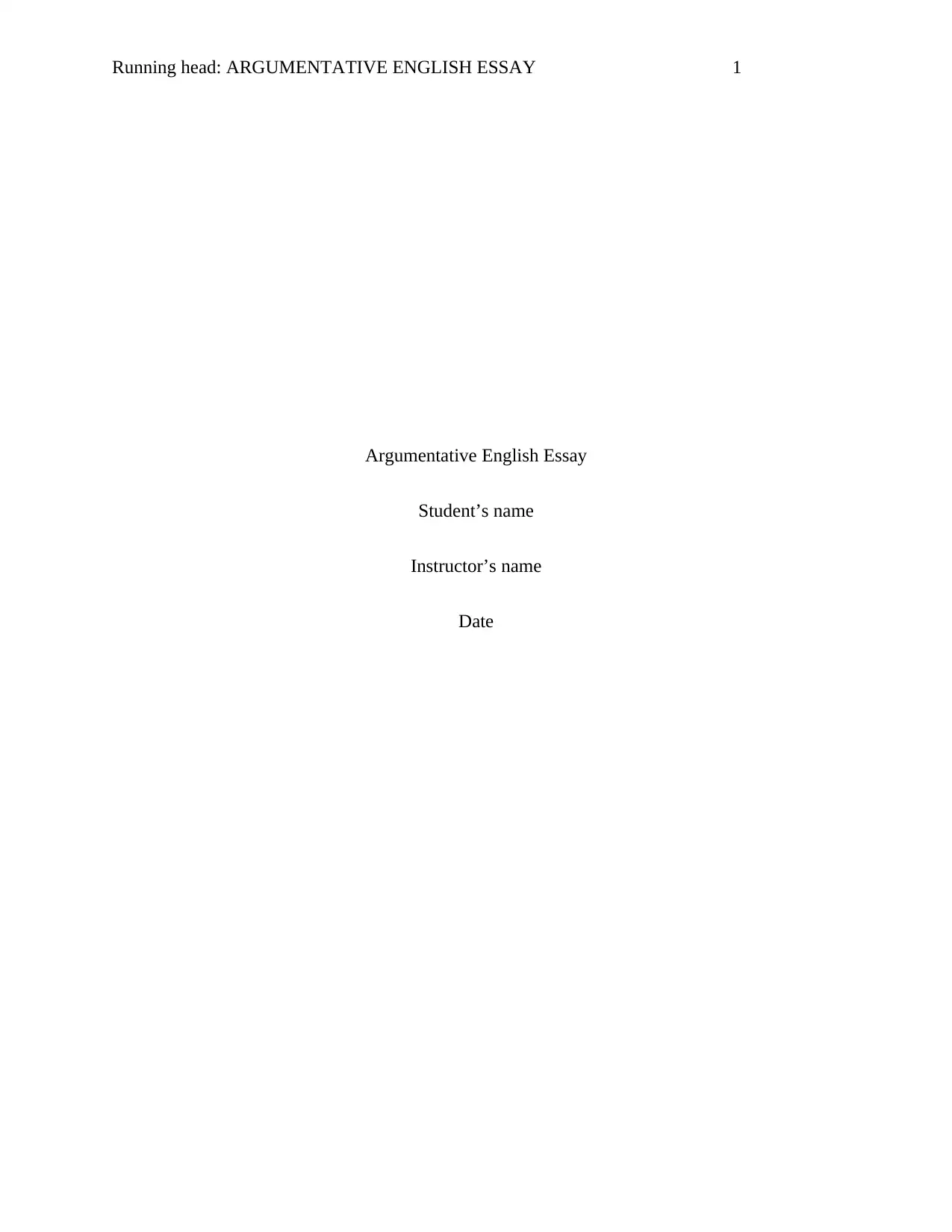
Running head: ARGUMENTATIVE ENGLISH ESSAY 1
Argumentative English Essay
Student’s name
Instructor’s name
Date
Argumentative English Essay
Student’s name
Instructor’s name
Date
Paraphrase This Document
Need a fresh take? Get an instant paraphrase of this document with our AI Paraphraser
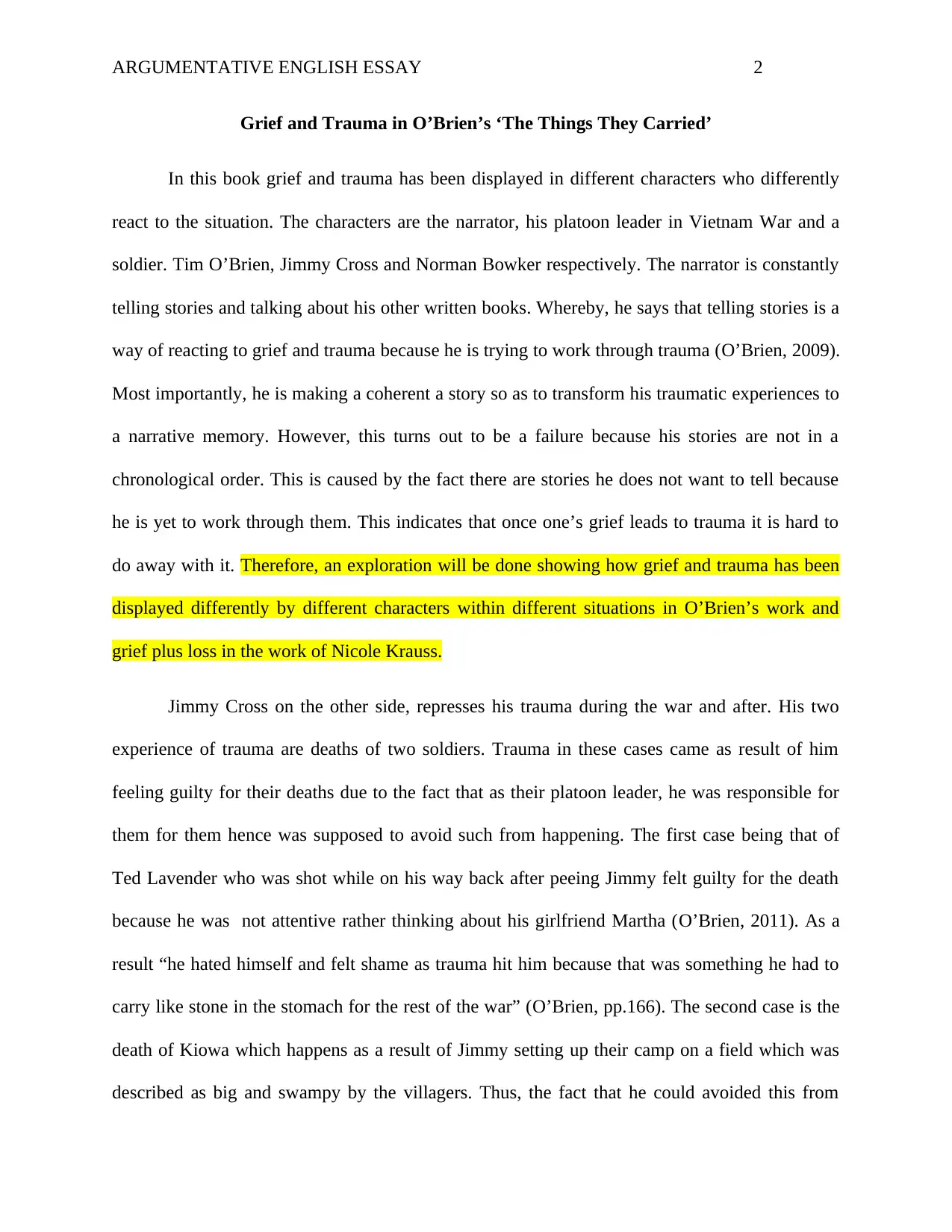
ARGUMENTATIVE ENGLISH ESSAY 2
Grief and Trauma in O’Brien’s ‘The Things They Carried’
In this book grief and trauma has been displayed in different characters who differently
react to the situation. The characters are the narrator, his platoon leader in Vietnam War and a
soldier. Tim O’Brien, Jimmy Cross and Norman Bowker respectively. The narrator is constantly
telling stories and talking about his other written books. Whereby, he says that telling stories is a
way of reacting to grief and trauma because he is trying to work through trauma (O’Brien, 2009).
Most importantly, he is making a coherent a story so as to transform his traumatic experiences to
a narrative memory. However, this turns out to be a failure because his stories are not in a
chronological order. This is caused by the fact there are stories he does not want to tell because
he is yet to work through them. This indicates that once one’s grief leads to trauma it is hard to
do away with it. Therefore, an exploration will be done showing how grief and trauma has been
displayed differently by different characters within different situations in O’Brien’s work and
grief plus loss in the work of Nicole Krauss.
Jimmy Cross on the other side, represses his trauma during the war and after. His two
experience of trauma are deaths of two soldiers. Trauma in these cases came as result of him
feeling guilty for their deaths due to the fact that as their platoon leader, he was responsible for
them for them hence was supposed to avoid such from happening. The first case being that of
Ted Lavender who was shot while on his way back after peeing Jimmy felt guilty for the death
because he was not attentive rather thinking about his girlfriend Martha (O’Brien, 2011). As a
result “he hated himself and felt shame as trauma hit him because that was something he had to
carry like stone in the stomach for the rest of the war” (O’Brien, pp.166). The second case is the
death of Kiowa which happens as a result of Jimmy setting up their camp on a field which was
described as big and swampy by the villagers. Thus, the fact that he could avoided this from
Grief and Trauma in O’Brien’s ‘The Things They Carried’
In this book grief and trauma has been displayed in different characters who differently
react to the situation. The characters are the narrator, his platoon leader in Vietnam War and a
soldier. Tim O’Brien, Jimmy Cross and Norman Bowker respectively. The narrator is constantly
telling stories and talking about his other written books. Whereby, he says that telling stories is a
way of reacting to grief and trauma because he is trying to work through trauma (O’Brien, 2009).
Most importantly, he is making a coherent a story so as to transform his traumatic experiences to
a narrative memory. However, this turns out to be a failure because his stories are not in a
chronological order. This is caused by the fact there are stories he does not want to tell because
he is yet to work through them. This indicates that once one’s grief leads to trauma it is hard to
do away with it. Therefore, an exploration will be done showing how grief and trauma has been
displayed differently by different characters within different situations in O’Brien’s work and
grief plus loss in the work of Nicole Krauss.
Jimmy Cross on the other side, represses his trauma during the war and after. His two
experience of trauma are deaths of two soldiers. Trauma in these cases came as result of him
feeling guilty for their deaths due to the fact that as their platoon leader, he was responsible for
them for them hence was supposed to avoid such from happening. The first case being that of
Ted Lavender who was shot while on his way back after peeing Jimmy felt guilty for the death
because he was not attentive rather thinking about his girlfriend Martha (O’Brien, 2011). As a
result “he hated himself and felt shame as trauma hit him because that was something he had to
carry like stone in the stomach for the rest of the war” (O’Brien, pp.166). The second case is the
death of Kiowa which happens as a result of Jimmy setting up their camp on a field which was
described as big and swampy by the villagers. Thus, the fact that he could avoided this from
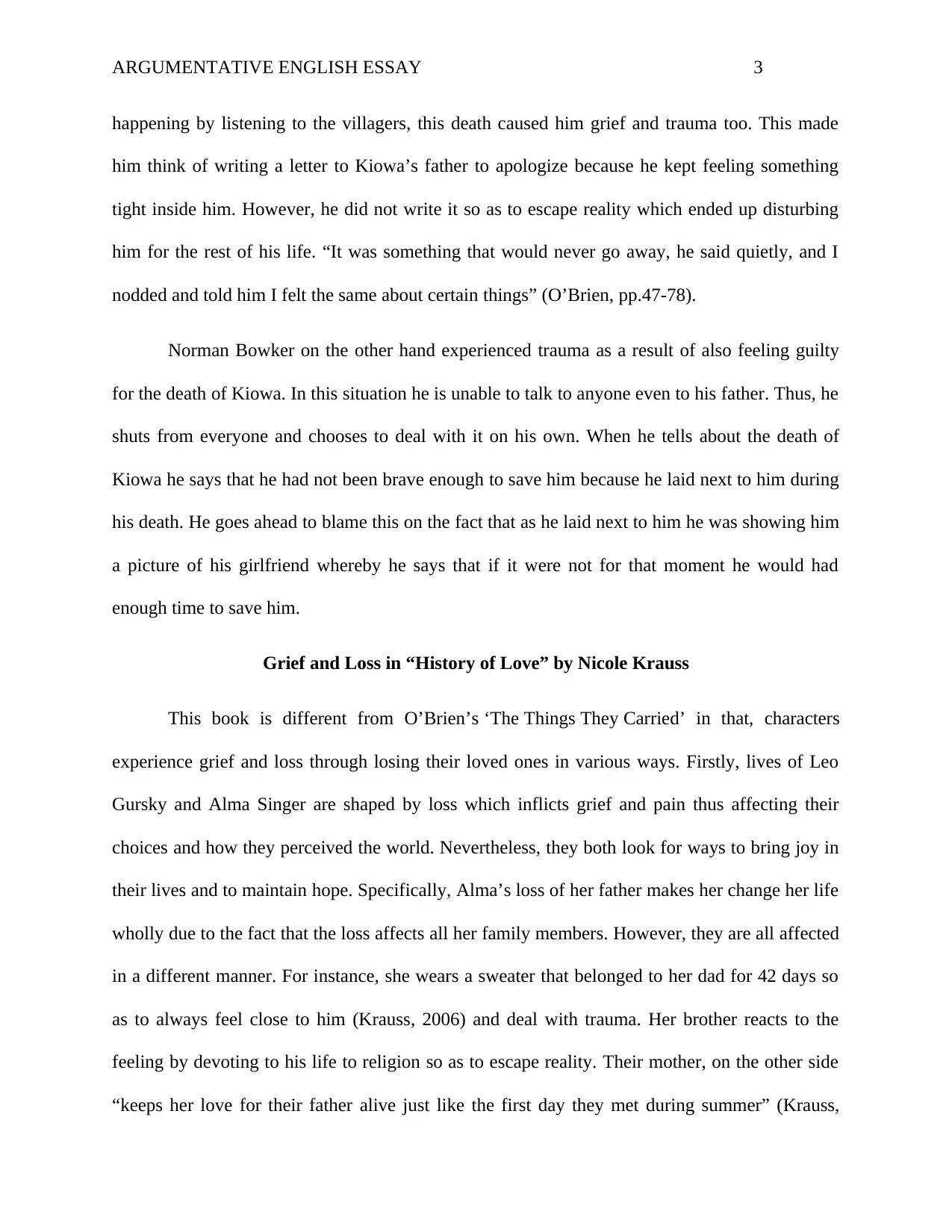
ARGUMENTATIVE ENGLISH ESSAY 3
happening by listening to the villagers, this death caused him grief and trauma too. This made
him think of writing a letter to Kiowa’s father to apologize because he kept feeling something
tight inside him. However, he did not write it so as to escape reality which ended up disturbing
him for the rest of his life. “It was something that would never go away, he said quietly, and I
nodded and told him I felt the same about certain things” (O’Brien, pp.47-78).
Norman Bowker on the other hand experienced trauma as a result of also feeling guilty
for the death of Kiowa. In this situation he is unable to talk to anyone even to his father. Thus, he
shuts from everyone and chooses to deal with it on his own. When he tells about the death of
Kiowa he says that he had not been brave enough to save him because he laid next to him during
his death. He goes ahead to blame this on the fact that as he laid next to him he was showing him
a picture of his girlfriend whereby he says that if it were not for that moment he would had
enough time to save him.
Grief and Loss in “History of Love” by Nicole Krauss
This book is different from O’Brien’s ‘The Things They Carried’ in that, characters
experience grief and loss through losing their loved ones in various ways. Firstly, lives of Leo
Gursky and Alma Singer are shaped by loss which inflicts grief and pain thus affecting their
choices and how they perceived the world. Nevertheless, they both look for ways to bring joy in
their lives and to maintain hope. Specifically, Alma’s loss of her father makes her change her life
wholly due to the fact that the loss affects all her family members. However, they are all affected
in a different manner. For instance, she wears a sweater that belonged to her dad for 42 days so
as to always feel close to him (Krauss, 2006) and deal with trauma. Her brother reacts to the
feeling by devoting to his life to religion so as to escape reality. Their mother, on the other side
“keeps her love for their father alive just like the first day they met during summer” (Krauss,
happening by listening to the villagers, this death caused him grief and trauma too. This made
him think of writing a letter to Kiowa’s father to apologize because he kept feeling something
tight inside him. However, he did not write it so as to escape reality which ended up disturbing
him for the rest of his life. “It was something that would never go away, he said quietly, and I
nodded and told him I felt the same about certain things” (O’Brien, pp.47-78).
Norman Bowker on the other hand experienced trauma as a result of also feeling guilty
for the death of Kiowa. In this situation he is unable to talk to anyone even to his father. Thus, he
shuts from everyone and chooses to deal with it on his own. When he tells about the death of
Kiowa he says that he had not been brave enough to save him because he laid next to him during
his death. He goes ahead to blame this on the fact that as he laid next to him he was showing him
a picture of his girlfriend whereby he says that if it were not for that moment he would had
enough time to save him.
Grief and Loss in “History of Love” by Nicole Krauss
This book is different from O’Brien’s ‘The Things They Carried’ in that, characters
experience grief and loss through losing their loved ones in various ways. Firstly, lives of Leo
Gursky and Alma Singer are shaped by loss which inflicts grief and pain thus affecting their
choices and how they perceived the world. Nevertheless, they both look for ways to bring joy in
their lives and to maintain hope. Specifically, Alma’s loss of her father makes her change her life
wholly due to the fact that the loss affects all her family members. However, they are all affected
in a different manner. For instance, she wears a sweater that belonged to her dad for 42 days so
as to always feel close to him (Krauss, 2006) and deal with trauma. Her brother reacts to the
feeling by devoting to his life to religion so as to escape reality. Their mother, on the other side
“keeps her love for their father alive just like the first day they met during summer” (Krauss,
⊘ This is a preview!⊘
Do you want full access?
Subscribe today to unlock all pages.

Trusted by 1+ million students worldwide
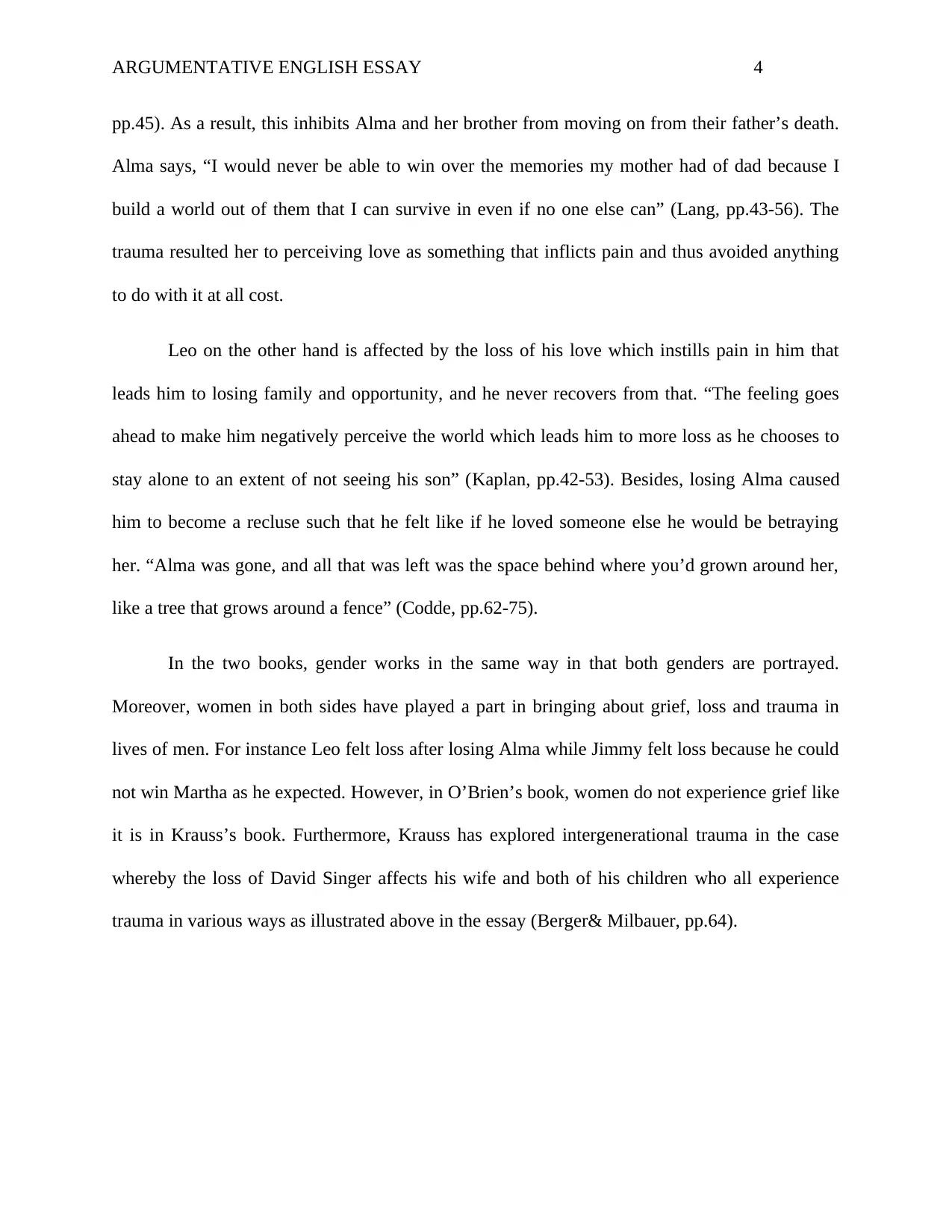
ARGUMENTATIVE ENGLISH ESSAY 4
pp.45). As a result, this inhibits Alma and her brother from moving on from their father’s death.
Alma says, “I would never be able to win over the memories my mother had of dad because I
build a world out of them that I can survive in even if no one else can” (Lang, pp.43-56). The
trauma resulted her to perceiving love as something that inflicts pain and thus avoided anything
to do with it at all cost.
Leo on the other hand is affected by the loss of his love which instills pain in him that
leads him to losing family and opportunity, and he never recovers from that. “The feeling goes
ahead to make him negatively perceive the world which leads him to more loss as he chooses to
stay alone to an extent of not seeing his son” (Kaplan, pp.42-53). Besides, losing Alma caused
him to become a recluse such that he felt like if he loved someone else he would be betraying
her. “Alma was gone, and all that was left was the space behind where you’d grown around her,
like a tree that grows around a fence” (Codde, pp.62-75).
In the two books, gender works in the same way in that both genders are portrayed.
Moreover, women in both sides have played a part in bringing about grief, loss and trauma in
lives of men. For instance Leo felt loss after losing Alma while Jimmy felt loss because he could
not win Martha as he expected. However, in O’Brien’s book, women do not experience grief like
it is in Krauss’s book. Furthermore, Krauss has explored intergenerational trauma in the case
whereby the loss of David Singer affects his wife and both of his children who all experience
trauma in various ways as illustrated above in the essay (Berger& Milbauer, pp.64).
pp.45). As a result, this inhibits Alma and her brother from moving on from their father’s death.
Alma says, “I would never be able to win over the memories my mother had of dad because I
build a world out of them that I can survive in even if no one else can” (Lang, pp.43-56). The
trauma resulted her to perceiving love as something that inflicts pain and thus avoided anything
to do with it at all cost.
Leo on the other hand is affected by the loss of his love which instills pain in him that
leads him to losing family and opportunity, and he never recovers from that. “The feeling goes
ahead to make him negatively perceive the world which leads him to more loss as he chooses to
stay alone to an extent of not seeing his son” (Kaplan, pp.42-53). Besides, losing Alma caused
him to become a recluse such that he felt like if he loved someone else he would be betraying
her. “Alma was gone, and all that was left was the space behind where you’d grown around her,
like a tree that grows around a fence” (Codde, pp.62-75).
In the two books, gender works in the same way in that both genders are portrayed.
Moreover, women in both sides have played a part in bringing about grief, loss and trauma in
lives of men. For instance Leo felt loss after losing Alma while Jimmy felt loss because he could
not win Martha as he expected. However, in O’Brien’s book, women do not experience grief like
it is in Krauss’s book. Furthermore, Krauss has explored intergenerational trauma in the case
whereby the loss of David Singer affects his wife and both of his children who all experience
trauma in various ways as illustrated above in the essay (Berger& Milbauer, pp.64).
Paraphrase This Document
Need a fresh take? Get an instant paraphrase of this document with our AI Paraphraser
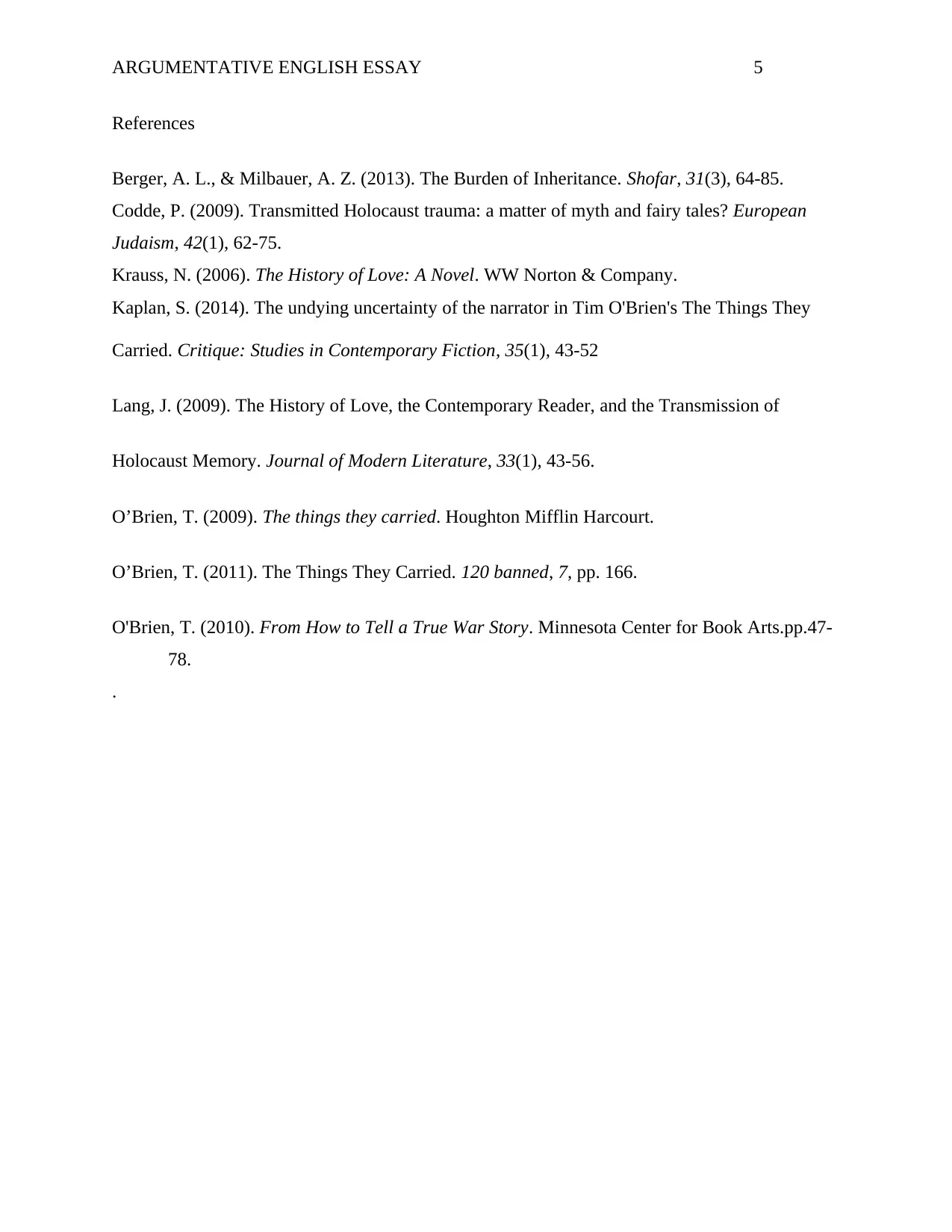
ARGUMENTATIVE ENGLISH ESSAY 5
References
Berger, A. L., & Milbauer, A. Z. (2013). The Burden of Inheritance. Shofar, 31(3), 64-85.
Codde, P. (2009). Transmitted Holocaust trauma: a matter of myth and fairy tales? European
Judaism, 42(1), 62-75.
Krauss, N. (2006). The History of Love: A Novel. WW Norton & Company.
Kaplan, S. (2014). The undying uncertainty of the narrator in Tim O'Brien's The Things They
Carried. Critique: Studies in Contemporary Fiction, 35(1), 43-52
Lang, J. (2009). The History of Love, the Contemporary Reader, and the Transmission of
Holocaust Memory. Journal of Modern Literature, 33(1), 43-56.
O’Brien, T. (2009). The things they carried. Houghton Mifflin Harcourt.
O’Brien, T. (2011). The Things They Carried. 120 banned, 7, pp. 166.
O'Brien, T. (2010). From How to Tell a True War Story. Minnesota Center for Book Arts.pp.47-
78.
.
References
Berger, A. L., & Milbauer, A. Z. (2013). The Burden of Inheritance. Shofar, 31(3), 64-85.
Codde, P. (2009). Transmitted Holocaust trauma: a matter of myth and fairy tales? European
Judaism, 42(1), 62-75.
Krauss, N. (2006). The History of Love: A Novel. WW Norton & Company.
Kaplan, S. (2014). The undying uncertainty of the narrator in Tim O'Brien's The Things They
Carried. Critique: Studies in Contemporary Fiction, 35(1), 43-52
Lang, J. (2009). The History of Love, the Contemporary Reader, and the Transmission of
Holocaust Memory. Journal of Modern Literature, 33(1), 43-56.
O’Brien, T. (2009). The things they carried. Houghton Mifflin Harcourt.
O’Brien, T. (2011). The Things They Carried. 120 banned, 7, pp. 166.
O'Brien, T. (2010). From How to Tell a True War Story. Minnesota Center for Book Arts.pp.47-
78.
.
1 out of 5
Related Documents
Your All-in-One AI-Powered Toolkit for Academic Success.
+13062052269
info@desklib.com
Available 24*7 on WhatsApp / Email
![[object Object]](/_next/static/media/star-bottom.7253800d.svg)
Unlock your academic potential
Copyright © 2020–2026 A2Z Services. All Rights Reserved. Developed and managed by ZUCOL.



